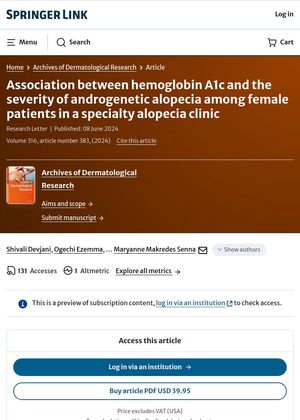TLDR Higher blood sugar levels may lead to more severe hair loss in women.
The study investigates the relationship between hemoglobin A1c levels and the severity of androgenetic alopecia in female patients at a specialty alopecia clinic. The authors found a significant association, suggesting that higher hemoglobin A1c levels, which indicate poorer blood sugar control, may correlate with more severe hair loss in women. This highlights the potential role of metabolic factors in the progression of androgenetic alopecia. The study did not generate or analyze new datasets, and all authors contributed to the manuscript and study design. No competing interests were declared.
 2 citations
,
December 2019 in “Journal of Dermatological Treatment”
2 citations
,
December 2019 in “Journal of Dermatological Treatment” Metabolic syndrome reduces effectiveness of hair loss treatment.
10 citations
,
January 2019 in “Indian Journal of Dermatology” Early-onset male hair loss is linked to metabolic syndrome, suggesting a need for heart health monitoring and lifestyle changes.
 21 citations
,
April 2016 in “International Journal of Dermatology”
21 citations
,
April 2016 in “International Journal of Dermatology” Metabolic syndrome linked to female hair loss; waist size and high blood pressure important factors.
 49 citations
,
June 2003 in “European journal of cardiovascular prevention & rehabilitation”
49 citations
,
June 2003 in “European journal of cardiovascular prevention & rehabilitation” Hair loss in middle-aged women is often linked to insulin resistance and a family history of hair loss, particularly from their fathers.
1 citations
,
January 2022 in “Springer eBooks”  8 citations
,
January 2013 in “Journal of The Korean Medical Association”
8 citations
,
January 2013 in “Journal of The Korean Medical Association” Korean hair is typically thicker with a slower growth rate, and treatments like Dutasteride are effective for male pattern hair loss without major side effects.
1 citations
,
March 2000 in “PubMed” A 16-year-old boy's alopecia areata progressed unusually to resemble male pattern baldness.
 January 2000 in “Springer eBooks”
January 2000 in “Springer eBooks” Androgenic Alopecia is commonly known as male or female pattern baldness.
34 citations
,
April 1982 in “BMJ” 48 citations
,
April 1982 in “Clinics in Plastic Surgery”





